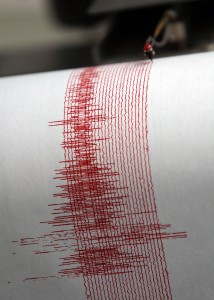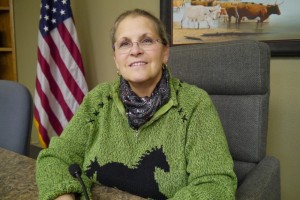Could Earthquakes Shake Up the Race for Railroad Commissioner?

Photo: OLIVER BERG DPA/LANDOV
Most candidates for Railroad Commission of Texas don't recognize the link between quakes and injection wells.
Scientists have known that man can create earthquakes by injecting fluids into the ground for decades. But if you listen to the people campaigning to regulate the Texas oil and gas industry, you may think the idea was in serious dispute.
Every Republican party candidate this primary season for the Railroad Commission denies that there is a link between injection wells used to pump oil and gas waste water underground and the surge in earthquakes that have struck Texas since the current oil and gas boom got underway. (The Railroad Commission of Texas has nothing to do with railroads; it’s the state’s oil and gas regulator.)
It’s a denial that has people living in quake-prone parts of the state deeply upset.
“Are they blind?!” Lynda Stokes, the mayor of the North Texas town of Reno, says. “Except for maybe one or two, every study says that they [quakes and injection wells] are linked. How can they say that there is no correlation?
Reno is at the epicenter of the most recent swarm of quakes. She calls herself a political independent.

Doualy Xaykaothao / KERA News
Lynda Stokes is the mayor of Reno in Parker County, where more than 30 earthquakes have been recorded since November.
“[Candidates are] choosing to just turn their face and look the other way, while the very people they’re supposed to be representing and protecting are suffering the consequences,” she says.
Like many in her area, she blames political contributions from the oil and gas industry for politicians’ unwillingness to acknowledge the link between disposal wells and quakes. She believes those politicians will pay a price at the ballot box.
“Yes, I do,” she says. “We have a lot of very intelligent people in our area. We have a lot of people who get on the internet and read the studies that are available and everybody knows that these wells are linked to this.”
None of the current slate of Republican politicians running for the open seat on the Railroad Commission has acknowledged that injection wells can cause earthquakes.
When asked by StateImpact Texas how she explains a recent “swarm” of quakes near the North Texas town of Azle that are occurring within a few miles of disposal wells, Becky Berger, one of the Republican candidates, answered that “the earth is covered all over by faults.”

Photo courtesy of Berger campaign website.
Becky Berger is running to be the Republican nominees for Railroad Commission.
“One of the things the people in Azle didn’t realize was that their developer had them build that subdivision on top of a fault zone,” she says. “And there’s nothing the Railroad Commission can do about that!”
The other GOP candidates did not respond to our request for comment, but a report in the Dallas Morning News by David Barer details how each of them share a similar position to Berger’s, as does one of the two candidates running as a Democrat.
Of candidates who have responded to StateImpact Texas’ request, only Mark Miller, a Libertarian, and Steve Brown, a Democrat, agreed with the body of scientific evidence showing how injection wells can, in some cases, cause earthquakes.

Photo courtesy of Steve Brown for RRC Facebook page.
Steve Brown is running to become the Democratic nominee for Railroad Commission.
When it comes to the more than 30 quakes that have recently jolted residents of Azle and Reno in North Texas, Brown tells StateImpact Texas “the [Railroad] Commission needs to find a way to suspend operations for the cluster of injection wells in that area until we’ve found some kind of conclusive evidence that everyone’s comfortable with of what’s causing these quakes.”
He believes that position will win him votes as well, though that may be harder than it sounds.
Many of the parts of Texas that are feeling a surge in quakes are rural or exurban. Those are, not surprisingly, the same areas where disposal wells are often located. They are also usually areas that dependably vote Republican. In Parker County, where the town of Reno is located, voters supported Mitt Romney by 82 percent in 2012.
Still, Brown, the leading Democratic candidate, thinks he has a chance with those voters.
“Sitting down with them, and talking with them,” Brown says, “it became quite clear that this became more about their interests than their political alignment. So I think that there are Parker counties throughout the state.”
Zan Prince, head of the Parker County GOP, believes if there are “Parker counties throughout the state,” then she probably has no reason to worry.
“I think when it comes to general election, GOP voters will show up regardless whether or not this issue is resolved concerning the earthquake connection to drilling,” she tells StateImpact Texas.
Regardless of who wins, the issue already seems to have more people focused on the race for the Railroad Commission, a race that’s usually treated as a down-ballot afterthought by many Texas voters.



